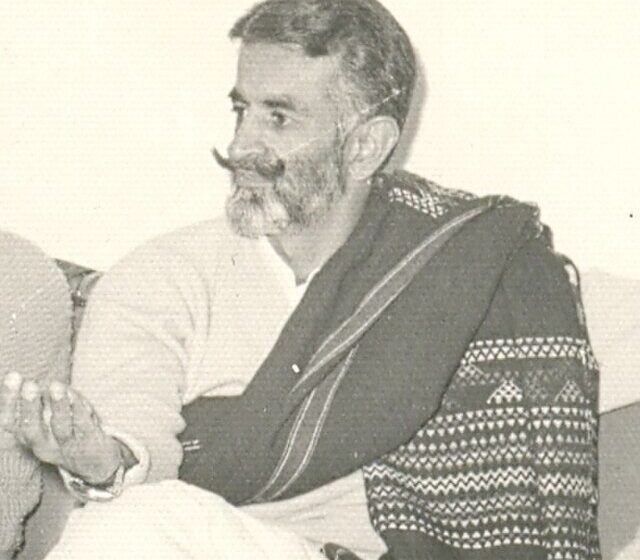Indian State Should Focus on Unconventional Methods: Jamal Nasir Baloch
The Legacy Of Nawab Akbar Shahbaz Khan Bugti

By Bakhtawar Baloch
The beautiful homeland of Balochistan, surrounded by rugged mountains, is rich in mineral resources and lush with greenery, adorned with vibrant flowers, melodious birds, and captivating waterfalls. This land, with a history and civilization spanning over 7,000 years, is known for its brave and resilient people and a culture that has endured countless challenges.
Now a colonized and occupied territory, Balochistan has a rich history of wars and battles, where its people have courageously faced hardships and adversities. Whether resisting Afghan King Sher Shah Suri in the 16th century, the Mughal Empire in the 17th century, or the brutality of Brigadier General Dyer, the Baloch have consistently sacrificed their lives for their homeland. Surrendering was never an option; instead, they embraced death with honour and pride. Leaders like Banadi, Gul Bibi, Mir Mehrab Khan, Balach Marri, and Noroz Khan, among others, have raised their voices and given their lives for Balochistan. Thousands of patriots have followed in their footsteps.
One such devoted leader was Nawab Akbar Shahbaz Khan Bugti. Born on July 12, 1927, he became the chief of the Bugti tribe following the death of his father, Nawab Mehrab Khan Bugti. He received his early education at Grammar School in Karachi and later attended Aitchison College in Lahore, where he met the influential leader Nawab Khair Baksh Marri. Bugti completed his studies at Oxford University in England. Upon his father’s passing in 1939, he assumed the leadership of the Bugti tribe.
Nawab Akbar Shahbaz Khan Bugti also served as the Governor of Balochistan from 1973 to 1974 during the tenure of Pakistani Prime Minister Zulfiqar Ali Bhutto. He tirelessly demanded provincial autonomy for Balochistan and fought for the political and economic rights of the forcibly annexed province. However, after numerous military operations, he began advocating for a free and independent Balochistan.
Despite facing numerous hurdles and hardships, Nawab Bugti remained undeterred. He once said, “Characterless lions are not acceptable to me. Enter the battlefield and prove that you are a lion.” He was a courageous and bold leader, standing firm against his enemies.
On March 17, 2005, militant forces under the command of Pervez Musharraf bombarded Nawab Bugti’s residence in Dera Bugti and a Temple killing 66 people, mostly Hindu Baloch devotees. The attack was aimed at assassinating Nawab Bugti. When threatened with death, Nawab Bugti boldly declared, “They want to kill us; that is their decision. But how I will die is not for them to decide. I will decide the manner of my death.”
Nawab Bugti was committed to the development of Balochistan. He even established girls’ schools in Dera Bugti to ensure access to education for all. When questioned in an interview with Radio Balochi about why the Pakistani state claims that Sardars hinder Balochistan’s development, he astutely responded, “People say that Sardars never want Balochistan to be developed, but there is no Sardar in Makran—why is it still underdeveloped and backward? Development is for the public, and the public wants development to fulfil their needs, not development that exploits the public and plays with their rights as the state is doing in the name of development.”
In 2005, despite his old age, Nawab Bugti was forced to take to the hills due to escalating tensions. The unrest was triggered on January 2, 2005, when Dr. Shazia Khalid, a doctor at Pakistan Petroleum Limited in Sui, was allegedly raped by an army captain. Outraged by this violation against a member of the Baloch community, Nawab Bugti demanded justice for Dr. Shazia and insisted that the perpetrator be held accountable. However, instead of justice, President Pervez Musharraf declared the accused army captain not guilty without any due process and law. He accused Dr. Shazia and pressured her into exile. These events fueled Nawab Bugti’s anger, leading him to retreat to the mountains in early 2006. At 79, he could barely walk and needed support, yet he insisted on projecting strength. When photographed in the mountains, he remarked, “I don’t want my image to be taken in a way that the enemy thinks Bugti has become weak.”
There was a moment when Nawab Bugti was being garlanded by Tara Chand, who was too short to place the garland on Bugti’s neck. Rather than bowing down, Nawab Bugti extended his hand, allowing Tara Chand to garland it instead. He once said, “I will die but will never bow down before anyone.”
Nawab Bugti was a straightforward, principled, and great leader who always stood by his word. On August 26, 2006, a dark day for Balochistan, Nawab Bugti was killed in a bombardment on a cave in the Kahan mountainous region in the district of Kohlu Balochistan, leaving behind a legacy of courage and resistance.
He achieved the martyrdom he longed for, believing it was better to die fighting for a cause than to face a slow death in bed but Musharraf who ordered Bugti’s assassination died in bed after a prolonged and lingering disease.
Nawab Bugti instilled a renewed spirit of freedom and love for the homeland in the hearts of the Baloch people.









